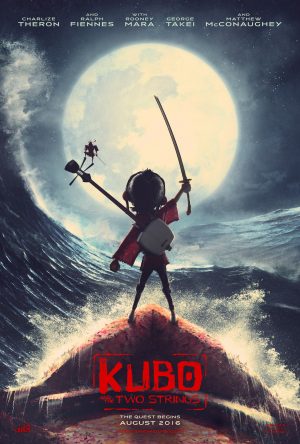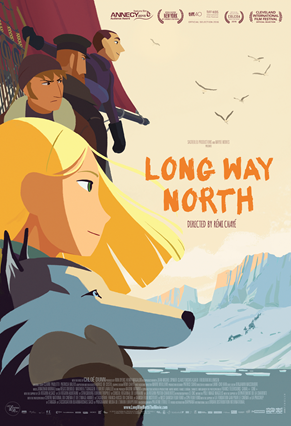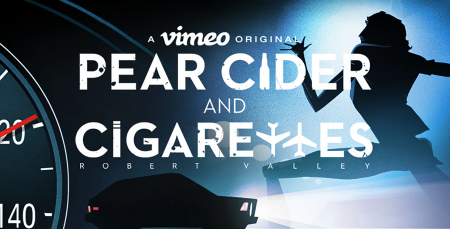Review: Kubo and the Two Strings
Nearly nine months into 2016, and I can name like six movies I have enjoyed. Mercifully, Kubo and the Two Strings makes it seven. If you must blink, do it now.
This is Laika Entertainment’s fourth stop-motion animated feature (after Coraline, Paranorman, and The Boxtrolls), so how does it rank? Well it’s certainly better than The Boxtrolls, though admittedly I can’t give a fair judgement of Boxtrolls because I nearly got into my first fist fight as an adult because of it (don’t bring toys for your dumb kids to play in the aisles with to a movie, and don’t start shouting in someone’s face when you get called out for being inconsiderate). But I digress.
Kubo is an adventure movie through and through; an eleven-year-old boy must recover an unbreakable sword, an impenetrable breastplate, and an invulnerable helmet, with the help of a talking monkey and a samurai beetle-man. Standard stuff, right? Well yeah, kinda. The story is your conventional hero’s journey with a couple of artistic flourishes here and there. I can’t fault the film too much for just telling a simple story, but Laika did give us Coraline and Paranorman (Coraline being a masterwork, and Paranorman being a worthy follow-up), so the standards are higher. But this is also the year of The Secret Life of Pets, Norm of the North, and The goddamn Angry Birds Movie; the saying goes “After you hit yourself with two hammers every day, getting hit by just one hammer feels good” and this is just a teeny tiny for-cracking-hardboiled-eggs hammer. It’s such a minor quibble.
 Storytelling and music are a big motif of the film, with Kubo and his mother using a shamisen (thank you, Google) as a magical weapon and for Kubo to control his origami creations. There’s a wonderful sequence at the beginning of the film where Kubo plays his shamisen and tells stories of his dead dad in the village. Hey, a story about storytelling, and it never really gets meta with it, which is nice. I think the monkey makes one out-of-character crack about an origami samurai “looking like scissors were involved” and that’s about it.
Storytelling and music are a big motif of the film, with Kubo and his mother using a shamisen (thank you, Google) as a magical weapon and for Kubo to control his origami creations. There’s a wonderful sequence at the beginning of the film where Kubo plays his shamisen and tells stories of his dead dad in the village. Hey, a story about storytelling, and it never really gets meta with it, which is nice. I think the monkey makes one out-of-character crack about an origami samurai “looking like scissors were involved” and that’s about it.
Let’s talk the voice cast for a minute; this is one of the few aspects of the film that is hit-and-miss. First, a hit, Matthew McConaughey – he really is the most charming man on the planet. McConaughey plays a manic amnesiac samurai/beetleborg, simply named Beetle, his only vague memory being that he must’ve served Kubo’s father. There’s an ethereal quality to a performance when an actor really enjoys their role, and ho boy did he clearly have a good time; it’s unlike anything I’ve seen him do. The best way I can describe his character is a combination of Jack Sparrow and Dug the dog from Up. Yeah. That beautiful velvety-voiced man. The McConaissance continues.
A miss for the cast is Charlize Theron as Kubo’s guardian, a monkey named Monkey; which is a shame, she’s a good actress, but she doesn’t bring much to a motherly straight-man role. (Insert the picture of Charlize dragging her kid out of her car that went around the gossip circle a few months ago) It reminds me a lot of Meryl Streep’s underwhelming vocal performance in Fantastic Mr. Fox. She’s unusually flat and to use an acting term, she mostly spends the movie indicating her emotions as opposed to actually feeling them. Some people just aren’t meant to stand in a dimly-lit sound-booth alone and just act, which I think is the case here.
Another sort-of-miss is the Three-String Samurai himself, Kubo, voiced by Art Parkinson (Rickon Stark from Game of Thrones… yeah). Clearly, someone at Laika is a big fan of Game of Thrones because this is the second Stark child cast as the lead in one of their movies (Isaac Hempstead-Wright, Bran Stark, voiced the main character in The Boxtrolls). But y’know that show has bad actors too, right? *cough* Emilia Clark & Sophie Turner *cough*. He’s serviceable as the hero child, but only just, good child actors are hard enough to find – good child voice actors are nearly impossible.
An awesome surprise is Rooney Mara, voicing the spooky specter women in pursuit of Kubo. This goes back to how Matthew McConaughey clearly relished his role, and Rooney just went for it. I can imagine she looked at the script and thought “Wait, I get to cackle fiendishly? Oh hell yeah!”
The last two name actors are Ralph Fiennes as Kubo’s malevolent grandfather the Moon King, and George Takei as Featured Extra #2. Both are criminally underused; Fiennes is more limited by being the final boss character; but Takei, also the largest role voiced by an Asian actor, has about three lines – one of which is obviously “Oh myyyy.” Question: Does this film count as white-washing? It’s certainly a murky topic to begin with, and further complicated by this being an animated movie. But then again, I guess wouldn’t every English Dub of an Anime count as white-washing? I’m not ready to make a judgment here. Just something to think about.
** I should also mention that the design work from Laika is as spot on as always. I adore their use of UV/Blacklight effects, it's a brilliant visual that I don't think we get to see in other films, nor should we, it's that special Laika touchstone. The actual visual from the trailers that mentally sold my ticket was of Kubo's 'Aunts' floating across a river, those haunting geisha-masked women are probably some of the most evocative and memorable character designs I've seen this year. The only things even worth mentioning negatively are a sailboat Kubo composes from leaves, the idea behind it is solid, it just has a muddy color palette; and then the final monster looks a bit too much like the Leviathans in The Avengers. Again, teeny tiny egg-cracking hammer.
Man, stop-motion animation is beautiful, amiright? The work Laika is doing visually is truly inspiring at times; as part of the end credits – they show you the animation of the giant skeleton monster, and it’s not just huge in the context of the film, that puppet is easily ten feet tall. Showing behind the curtain like that has to make you want to bust out your camera and try a little animation yourself. It’s such a crime that stop-motion animation seems to always stall out with unappreciative kids, why do movies from Laika or Aardman Animations (the Wallace and Gromit people) always lose out to Dreamworks or Blue Sky? Take your kids to see these movies (just don’t drag them out to evening shows, those are for people who want to actually enjoy the goddamn movie). We gotta get them hooked; we can’t let them be the generation that ends smoking stop-motion animation.
If you have even the slightest inkling to see Kubo and the Two Strings, get out there and see it. Support your local major motion picture. In a year of garbage movie after garbage movie, you can do so much worse. Maybe you’ll even get to have a good time.
For the love of God, don’t choose to see Sausage Party over this.
Also stay for the end credits, there’s a nice cover of While My Guitar Gently Weeps by Regina Spektor; and also stay because that crew killed themselves making this movie for you.
[su_box title="Score: 4/5" style="glass" box_color="#8955ab" radius="6"]
Kubo and the Two Strings Director: Travis Knight Writers: Marc Haimes, Chris Butler Distributor: Laika Entertainment/Focus Features Rating: PG Run Time: 101 Min
[/su_box]
Shout! Factory Announces North American Release of "Long Way North"
Shout! Factory Films announced today that acclaimed animated feature LONG WAY NORTH, a film by Rémi Chayé, will open theatrically on September 30, 2016 in Los Angeles, New York and select major markets, to be followed by openings in additional cities. Directed by celebrated animator and filmmaker Rémi Chayé and produced by Sacrebleu Productions (Oscar®-Nominated Madagascar, Carnet de Voyage), Maybe Movies (Oscar®-Nominated Ernest & Celestine) and Norlum Studios (Oscar®-Nominated Song of the Sea), France 3 Cinéma and 2 Minutes, LONG WAY NORTH won the coveted Audience Award at the Annecy International Animation Film Festival and the winner of Grand Prize and the Governor of Tokyo Award at Tokyo Animation Festival 2016. This captivating animated adventure, bolstered by emotionally resonant storytelling and visually exquisite hand-drawn animation, has continued to attract universal acclaim as it enchants movie audiences around the world.
A spirited and inspiring tale of hope and courage, LONG WAY NORTH is the feature directorial debut of lauded animator Rémi Chayé (first AD and head of storyboard for Oscar®-Nominated The Secret of Kells,The Painting) and tells the story of a young heroine, persevering through a physical and emotional journey to find her explorer grandfather and his lost ship, the Davai.
 LONG WAY NORTH is set in the late 19th century Saint Petersburg. Sacha, a young girl from the Russian aristocracy, dreams of the Great North and anguishes over the fate of her grandfather, Oloukine, a renowned scientist and Arctic explorer who has yet to return from his latest expedition to conquer the North Pole.
LONG WAY NORTH is set in the late 19th century Saint Petersburg. Sacha, a young girl from the Russian aristocracy, dreams of the Great North and anguishes over the fate of her grandfather, Oloukine, a renowned scientist and Arctic explorer who has yet to return from his latest expedition to conquer the North Pole.
Sacha has always been fascinated by the adventurous life of her grandfather and has the same calling as Oloukine to be an explorer. But Sacha’s parents, who already made arrangements for her marriage, strongly disapprove the idea to say the least. Defying her destiny, Sacha flees her home and launches an adventure-filled quest toward the Great North in search of Oloukine and his ship.
LONG WAY NORTH features an exceptional English voice cast of Chloé Dunn, Vivienne Vermes, Peter Hudson, Antony Hickling, Tom Perkins, Geoffrey Greenhill, Claire Harrison-Bullett, Bibi Jacob, Martin Lewis, Tom Morton, Leslie Clack, Kester Lovelace and Damian Corcoran. *French voice cast include Christa Théret, Feodor Atkine, Thomas Sagols, Rémi Caillebot, Audrey Sablé, Fabirn Briche, Gabriel Le Doze and Boris Rehlinger.
Sacrebleu Productions and Maybe Movies present LONG WAY NORTH
Directed by Rémi Chayé; written by Claire Paoletti and Patricia Valeix; produced by Ron Dyens and Henri Magalon in co-production with Jean-Michel Spiner, Claus Toksvig Kjaer and Frederik Villumsen. A co-production of Sacrebleu Productions, Maybe Movies, France 3 Cinéma, 2 Minutes and Norlum.
Animated feature LONG WAY NORTH opens in U.S. cinemas on September 30, 2016
The film is rated PG and has a run time of 81 minutes. For more information about LONG WAY NORTH, please visit LongWayNorththeMovie.com
Review: Pear Cider & Cigarettes
I was lucky to go into Vimeo's second original film blind. I remember seeing some of my animation industry friends sharing the Kickstarter link for the short when it was live, even thinking of dropping a few bucks in myself though I eventually wouldn't. All I remembered was the aesthetic: glossy, digital, and glowing with hot electronic colors. From the outside, it gives the impression it might be some sort of disco throwback noir, the title and style suggesting something sexy and crime themed. The truth is, the short is less of a freshly waxed sports car and more a quiet reflective conversation in a corner booth in a nearly empty bar. The story, apparently at least somewhat autobiographical from the life of animator/graphic novelist Robert Valley, unfolds slowly as a somber portrait of rocky friendship and the incredible toll life leans on the living, carefully revealing itself all while framed with peerless aesthetic clarity.
Narrated from Valley's perspective, the short film concerns the life and early death of his friend Techno, a vibrant but self-destructive young man whose life of excitement is quickly and irreparably paralyzed by his devastated health and spiritual isolation. Valley's guide is one of regularly wounded affection, sacrificing for his friend but unable to avoid being a witness and recorder of Techno's eventually fatal personal flaws. While Techno's life of adventurous and bacchanalian excess is explored, the story suddenly and wisely cuts it short, giving you a picture of his electric peak before quickly pulling the rug out for a grueling look at his sudden but excruciatingly elongated decline. It's not a portrait of a party lifestyle and its consequences as the bow on the end of the narrative, it's the story of a man who loved life in a way that killed him as well as the other man who was held prisoner by friendship to watch him die.
 Something I was unaware of when I agreed to review the short was that I was already quite familiar with Robert Valley as an artist, being the primary contributor to the character designs on the underrated and short-lived animated series Tron: Uprising. Valley's singular style is immediately apparent in his work, his figures designed with angular and exaggerated anatomy, at times equally grotesque as it is expressive caricature. In Pear Cider and Cigarettes, Valley is able to be even more free and stylized, adapting the pages of the graphic novel the short is based on with a look that comes off contradictively as both naturalistically gestural and glossily digital at the same time, using the book as storyboards for the art. One thing the viewer might notice is the short actually works more like a motion comic than a true animated film much of the time, with most shots being very subtly animated still images, full frame by frame animation shots being rare. While this might be seen as a handicap to the short, it never once took away from the film despite noticing this. The slight animation techniques used being expressive enough and intelligently utilized that it gives the "still images" more dimension and character than some fully animated flash cartoons. Valley's detail fleshing out the world and the careful attention to gesture delivered by the animation team sets the storytelling style beyond reproach, rich with surprise.
Something I was unaware of when I agreed to review the short was that I was already quite familiar with Robert Valley as an artist, being the primary contributor to the character designs on the underrated and short-lived animated series Tron: Uprising. Valley's singular style is immediately apparent in his work, his figures designed with angular and exaggerated anatomy, at times equally grotesque as it is expressive caricature. In Pear Cider and Cigarettes, Valley is able to be even more free and stylized, adapting the pages of the graphic novel the short is based on with a look that comes off contradictively as both naturalistically gestural and glossily digital at the same time, using the book as storyboards for the art. One thing the viewer might notice is the short actually works more like a motion comic than a true animated film much of the time, with most shots being very subtly animated still images, full frame by frame animation shots being rare. While this might be seen as a handicap to the short, it never once took away from the film despite noticing this. The slight animation techniques used being expressive enough and intelligently utilized that it gives the "still images" more dimension and character than some fully animated flash cartoons. Valley's detail fleshing out the world and the careful attention to gesture delivered by the animation team sets the storytelling style beyond reproach, rich with surprise.
The audiowork rounds it out perfectly, with what looks like a very expensive catalog of licensed music to accompany the original contributions by Robert Trujillo. Smoky jazzy tracks from groups as disparate as Pink Floyd and Nightmares on Wax color the quiet rumble of the noir like narration, soothing and intimate, bringing you close to tell you previously unspoken secrets.
While a tough story to hear (and for Valley, I'd imagine, a tough story to tell), the short is a sad story, not a depressing one. There's a note of inevitability in Techno's eventual downfall and even his library of personal crimes along the way. A sense that for him, it would always end up this way somehow, a consequence of finding fulfillment in reckless and often selfish behavior. You don't hate him, even though you blame him. You don't mourn him, even though you feel the emptiness of his passing. While unflinching and presenting more flaws than admirable traits, Valley has crafted a beautiful, deeply felt tribute to his friend. One that invites you in to understand his friendship in a way that makes you feel his connection while only communicating in simple abstractions why he stayed so loyal to someone who only seemed to sacrifice when it was made biologically inescapable. It may have slick stylings, but the storytelling here results in one of the most real and grounded human stories I've experienced in quite a while.
[su_box title="Score: 5/5" style="glass" box_color="#8955ab" radius="6"]
Pear Cider & Cigarettes Creator: Robert Valley Price: $4.99 (Rent), $8.99 (Buy) Available Here!
[/su_box]
FEATURED POSTS
Archive
- December 2025 1
- November 2025 2
- October 2025 3
- September 2025 4
- July 2025 5
- April 2025 2
- March 2025 2
- February 2025 3
- January 2025 6
- December 2024 2
- November 2024 1
- October 2024 1
- July 2024 4
- June 2024 3
- May 2024 2
- April 2024 7
- March 2024 7
- January 2024 3
- December 2023 2
- November 2023 4
- October 2023 6
- September 2023 5
- August 2023 12
- July 2023 4
- June 2023 3
- May 2023 2
- April 2023 3
- March 2023 2
- February 2023 1
- January 2023 3
- December 2022 2
- November 2022 3
- October 2022 3
- September 2022 2
- August 2022 1
- July 2022 6
- June 2022 4
- May 2022 14
- April 2022 15
- March 2022 9
- February 2022 5
- August 2019 1
- January 2019 2
- August 2018 12
- July 2018 188
- June 2018 159
- May 2018 204
- April 2018 156
- March 2018 178
- February 2018 180
- January 2018 176
- December 2017 112
- November 2017 143
- October 2017 152
- September 2017 210
- August 2017 180
- July 2017 199
- June 2017 150
- May 2017 129
- April 2017 184
- March 2017 180
- February 2017 178
- January 2017 195
- December 2016 164
- November 2016 135
- October 2016 163
- September 2016 219
- August 2016 248
- July 2016 267
- June 2016 242
- May 2016 160
- April 2016 199
- March 2016 163
- February 2016 145
- January 2016 175
- December 2015 105
- November 2015 166
- October 2015 130
- September 2015 147
- August 2015 135
- July 2015 183
- June 2015 190
- May 2015 140
- April 2015 275
- March 2015 198
- February 2015 430
- January 2015 198
- December 2014 144
- November 2014 187
- October 2014 239
- September 2014 193
- August 2014 289
- July 2014 334
- June 2014 308
- May 2014 244
- April 2014 253
- March 2014 268
- February 2014 232
- January 2014 254
- December 2013 302
- November 2013 276
- October 2013 349
- September 2013 262
- August 2013 325
- July 2013 349
- June 2013 303
- May 2013 373
- April 2013 416
- March 2013 124
- February 2013 16
- January 2013 26
- December 2012 24
- November 2012 17
- October 2012 18
- September 2012 22
- August 2012 13
- July 2012 20
- June 2012 12
- May 2012 23
- April 2012 20
- March 2012 9
- February 2012 20
- January 2012 96
- December 2011 93
- November 2011 73
- October 2011 52
- September 2011 54
- August 2011 37
- July 2011 1





